Geography and location
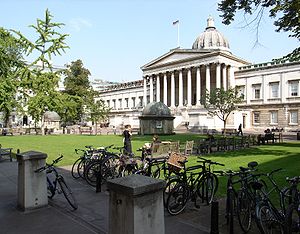
A summertime view from the South-Western corner of the quadrangle towards the UCL main building on Gower Street
University College London (UCL) is located in Bloomsbury, Central London. The main campus is on Gower Street, although there are also other UCL buildings throughout London. The Gower Street campus includes the UCL science and main libraries, the language departments, the history departments, the Bloomsbury theatre, the biology and physics departments, and the Petrie Museum of Egyptian Archaeology. A further set of buildings near neighbouring Gordon Street and Gordon Square includes the Institute of Archaeology, the chemistry department, the philosophy department the Bartlett School of The Built Environment and the School of Slavonic and East European Studies.
The area around UCL is occupied by a number of other renowned institutions, including the British Library, the British Museum, the Royal Academy of Art, the British Medical Association, and the Wellcome Trust. Many University of London schools and institutes are close by, and these include the SOAS, Birkbeck, University of London, the Institute of Education, the School of Advanced Study, London School of Hygiene & Tropical Medicine and the Senate House Library, which houses the University of London's world-class research collections; these focus on the arts, humanities and social sciences. (All UCL students on degree courses, and all UCL staff have full access to this library and its electronic resources).
The nearest London Underground station to the main UCL campus is Euston Square. Other nearby stations are Warren Street, Russell Square and Goodge Street, as well as Euston Underground and railway station.
历史
Main article: History of University College London
UCL was founded in 1826 under the name "London University" as a secular alternative to the religious universities of Oxford and Cambridge. As such, it is often described as the "third oldest English university" (although other institutions also claim this title).
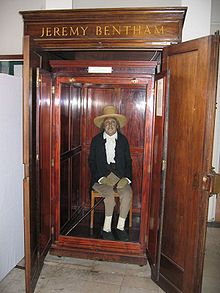
Jeremy Bentham's auto-icon is on public display in the cloisters of the UCL Main Building.
While the philosopher Jeremy Bentham is seen as the moving spirit behind the establishment of this new university for London, he personally took no part in the university's creation. Crucially, however, it was Bentham's powerful, radical ideas on education and society that had inspired the institution's founders, particularly the Scotsmen James Mill (1773–1836) and Henry Brougham (1778–1868), and shaped its creation.
In 1836, "London University" became known as "University College, London" (the comma between the words College and London was commonly used until recently), when, under a Royal Charter, it worked with the recently established King's College, London, to create the federal University of London.
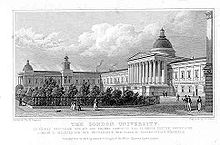
The London University as drawn by Thomas Hosmer Shepherd and published in 1827/28 (now UCL Main Building)
In 1907, the University of London was formally reconstituted with a new Royal charter, and new institutions joined the federation. Under this re-organisation it was necessary for each of the various institutions that now formed the University of London to lose their separate legal existences, and all offered degrees awarded by the University of London. This situation continued until 1977 when a new charter restored UCL's independence, although – at that time – not the power to award its own degrees.
In 2005 UCL was once again granted its own taught and research Degree Awarding Powers (DAP), and all new UCL students registered from 2007–08 qualify with UCL degrees rather than degrees of the University of London. The majority of continuing students who were enrolled on taught-degree programmes before the academic year 2007–08 had the choice of whether to receive a UCL degree or a University of London degree. These changes did not apply to students registered on the MBBS programme, or federal degrees, who continued to be awarded University of London degrees. Despite these DAP changes, UCL retains its strong links with the University of London.
In 2008, UCL became the first UK university to sign agreements for a campus in Australia, establishing the UCL School of Energy & Resources, Australia (SERAus) in Adelaide.
Present day
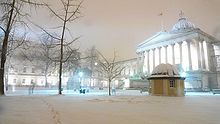
Main Quad during the snow in February 2009
Today, UCL is a member of the Russell Group of Universities, a part of the Golden Triangle, the European University Association, the Association of Commonwealth Universities, a member of Universities UK, and the League of European Research Universities. According to the latest THES - QS World University Rankings, UCL is ranked 4th in the world and 2nd in the UK after University of Cambridge, coming above University of Oxford and Imperial College London, who tie in joint 5th place.
UCL offers more than 200 degrees in traditional fields of study, with virtually all subjects rated internationally-excellent or world-leading. Many students get to learn abroad; UCL has partnerships with 46 of the world’s top 100 universities. UCL has hundreds of collaborative research and teaching partners, including almost 150 research links and 129 student-exchange partnerships with top European and North-American universities.
Although UCL voluntarily remains a constituent college of the University of London, it is in many ways comparable with free-standing, self-governing and independently funded universities, awarding its own degrees. Today, with over 8,000 staff and 22,000 students from over 150 countries (international students make up for a third of the student body), UCL is larger than most other universities in the United Kingdom, and is physically and academically at the centre of the University of London.
There are currently 21 Nobel prizewinners amongst UCL’s alumni and former staff. The most recent addition in October 2009 was Professor Charles Kao who was awarded a Nobel prize for Physics. Professor Kao undertook his PhD at UCL under the supervision of Professor Harold Barlow.
An ever-expanding worldwide network of more than 120,000 UCL alumni helps to maintain the university’s international reputation for access, innovation and excellence. The academic community includes 36 fellows of the Royal Society, 26 Fellows of the British Academy, 10 Fellows of the Royal Academy of Engineering and 78 Fellows of the Academy of Medical Sciences.
In 2008, UCL had an annual turnover of £635 million and fixed assets worth £581 million.
The current Provost and President of UCL is Professor Malcolm Grant.
Academic reputation
In 2009, UCL was rated as the fourth best university in the world, according to the THE–QS World University Rankings, coming ahead of Oxford University and Imperial College London.
According to the UK university league tables, UCL is and has been one of the UK's top multi-faculty universities throughout its long history. The Sunday Times newspaper, which recently voted UCL as 'University of the Year', describes UCL as 'the best multi-faculty university after Oxbridge'. Moreover, as part of the THES - QS World University Rankings, UCL was voted the 12th best university in the world amongst leading worldwide employers.
UCL law school in particular is "tipped by insiders as the best law faculty in the United Kingdom" and the Slade School of Fine Art, UCL's art department is internationally renowned for its excellence.
UCL's Bartlett School of Architecture and Institute of Archaeology are also largely considered the best in their respective fields in the country, and UCL's economics department rivals the LSE's in terms of competitiveness and entry requirements.
According to The Guardian newspaper, UCL, along with King's College, London School of Economics, and Imperial College, each "have international reputations that in this country only Oxbridge can beat".
UCL is ranked first in the UK for its staff/student ratio in The Times Good University Guide, The Sunday Times University Guide and The Guardian University Guide. UCL has the highest number of professors of any university in the UK, with more than 600 established and personal chairs, as well as the highest number of female professors. More than 4,000 academic and research staff are dedicated to research and teaching of the highest standards.
According to data released in July 2008 by the Thomson ISI Web of Knowledge’s Essential Science Indicators, UCL is the most-cited institution in the UK, and up one place from the last analysis to 13th in the world (Oxford University is ranked 18th and Cambridge University 20th). The analysis covers citations from 1 January 1998 to 30 April 2008, during which 46,166 UCL research papers attracted 803,566 citations. The number of citations generated by academic publications is an important indication of institutional importance and influence. The report covers citations in 21 subject areas. The results revealed some of UCL's key strengths:
in Laws – 1st in the United Kingdom
in Clinical Medicine – 1st outside North America
in Neuroscience & Behaviour – 1st outside North America and 2nd in the world
in Psychiatry/Psychology – 2nd outside North America
in Immunology – 2nd in Europe
in Pharmacology & Toxicology – 1st outside North America and 4th in the world
in Social Sciences, General – 1st outside North America
Shanghai Jiao Tong's 2009 analysis of subject areas showed that UCL's global ranking rose from 13th to 10th in Clinical Medicine & Pharmacy, with 1st place in the UK. In Life & Agricultural Sciences, UCL rose from 24th to 19th globally, with 3rd place in the UK.
UCL was also recently voted the 'Hippest University' in the UK by Vogue Magazine, and the best university in the UK for two years running by Pink Paper, the UK's leading gay and lesbian newspaper.
World Rankings
|
2009 |
2008 |
2007 |
2006 |
2005 |
| THE–QS World University Rankings |
4 |
7 |
9 |
25 |
28 |
| Academic Ranking of World Universities |
21 |
22 |
25 |
26 |
26 |
| Global University Ranking |
13 |
|
|
|
|
UK University Rankings
|
2010 |
2009 |
2008 |
2007 |
2006 |
2005 |
2004 |
2003 |
2002 |
2001 |
2000 |
1999 |
1998 |
1997 |
1996 |
1995 |
1994 |
1993 |
| Times Good University Guide |
5 |
7 |
6 |
5 |
6 |
6 |
6 |
11 |
5 |
5 |
5 |
5 |
5 |
7 |
8= |
4 |
4 |
4 |
| Guardian University Guide |
6 |
7 |
5 |
4 |
4 |
7 |
6 |
5 |
7 |
|
|
|
|
|
|
|
|
|
| Sunday Times University Guide |
4 |
4 |
6 |
5 |
5 |
5 |
5 |
5 |
5 |
8 |
6 |
6 |
5 |
5 |
|
|
|
|
|
Independent
Complete University Guide
supported by
PricewaterhouseCoopers |
8 |
8 |
6 |
|
|
|
|
|
|
|
|
|
|
|
|
|
|
|
| Daily Telegraph |
|
|
|
6 |
|
|
|
7 |
7 |
|
|
|
|
|
|
|
|
|
| FT |
|
|
|
|
|
|
|
5 |
5 |
4 |
4 |
4 |
|
|
|
|
|
|
Research
University College London (UCL) is one of the UK's premier research intensive universities. As such, it is an important member of the prestigious Russell Group of leading universities. UCL has placed cross-disciplinary research as a priority and is orientating its research around four "Grand Challenges". Professor David Price, Pro-Provost for Research explains: "We believe we have a moral obligation to make a difference to global problems, and to combine the knowledge that our research generates to develop wisdom that can be applied in each of the four Grand Challenges: Global Health, Sustainable Cities, Intercultural Interaction and Human Wellbeing."
This focus is paying dividends in terms of securing funding from research councils. In the Times Higher Education ranking of research council awards 2008-9 UCL is shown to have won the most research awards with 174 awards amounting to £81,365,000. In second place Cambridge won 162 awards amounting to £74,263,000. In third place Oxford won 153 awards amounting to £54,750,000. This is thought to be the first time that a university other than Cambridge or Oxford has headed the table.
UCL has also been very successful in securing research funding under the Engineering and Physical Sciences Research Council's (EPSRC) prestigious centres for doctoral training (CDTs). The aim of these centres is to "provide a supportive and exciting environment for students to carry out a challenging PhD-level research project together with taught coursework". UCL has won funding for 9 of these centres, the next highest allocation was 4 centres awarded to the University of Bath. The centres awarded to UCL are worth £40 million, which will fund 390 PhD places.
UCL's 9 CDTs are Energy Demand Reduction and the Built Environment (UCL Energy Institute and Loughborough University), Financial Computing (UCL Computer Science), Security Science (UCL Centre for Crime and Security Science), Photonic Systems Development (UCL Electronic and Electrical Engineering in partnership with Cambridge University), Virtual Environments, Imaging and Visualisation (UCL Computer Science and UCL Bartlett School), Molecular Modelling and Materials Science (UCL Chemistry), Urban Sustainability & Resilience (UCL Civil, Environmental and Geomatic Engineering and UCL Bartlett School), Bioprocess Engineering Leadership (UCL Biochemical Engineering) and CoMPLEX (UCL Life Sciences).
There are currently approximately 3,000 PhD students working at UCL. The University provides information for prospective PhD students on its Graduate web pages.
Admissions
Admissions at University College London is highly selective. The majority of UCL's undergraduate courses requires one to apply through the UCAS system.
Many of UCL's courses require 3 A grades at A Level, or a grade equivalent of 6,6,6 on higher level subjects on the International Baccalaureate Program.
Due to a very high proportion of applicants receiving the highest school grades, UCL, along with Imperial College London and the University of Cambridge is one of the first universities in the UK to make use of the A* grade at A-Level (to be introduced in 2010) for admissions, particularly for very oversubscribed courses such as Economics, Mathematics and European Social and Political Studies.
Alumni and academics
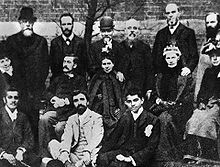
A group of students, including Mohandas K. 'Mahatma' Gandhi (kneeled, front row), from the UCL Vegetarian Society of 1890
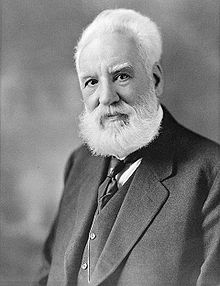
Alexander Graham Bell, inventor of the telephone, studied at UCL
Main article: list of University College London people
UCL alumni range from Mahatma Gandhi and Alexander Graham Bell, to Ricky Gervais, Chris Martin and all three other members of the band Coldplay, as well as two members of the band Keane.
Important authors include linguist David Crystal, Stella Gibbons, Robert Browning, Rabindranath Tagore (did not graduate), Raymond Briggs and G. K. Chesterton.
Scientists and engineers to have attended UCL include Francis Crick, John Ambrose Fleming, Joseph Lister, Roger Penrose, Colin Chapman, Patrick Head, physicist and astrobiologist Paul Davies, evolutionary biologist John Maynard Smith and the aforementioned Bell.
Artists, architects and designers include Sir William Coldstream, Sir Eduardo Paolozzi, Ben Nicholson and David Mlinaric.
Politicians figure highly in the lists, notably Sir Stafford Cripps (Chancellor of the Exchequer), William Wedgwood Benn, 1st Viscount Stansgate (Liberal and subsequent Labour politician), the first and former prime ministers of Japan (Hirobumi Ito and Junichiro Koizumi respectively) and Chaim Herzog, the former President of Israel. Moreover, the founding father of Kenya, Jomo Kenyatta was a UCL graduate. Wu Tingfang (Ng Choy) was Minister of Foreign Affairs and Acting Premier during the early days of the Republic of China. The Lord Mayor of the City of London 2008-9, Ian Luder is also an UCL alumnus.
Prominent UCL law graduates include a Lord Chancellor (Lord Herschell), the former Chief Justices of England (Lord Woolf), Hong Kong (Sir Yang Ti-liang), India (A.S. Anand) and Ghana (Samuel Azu Crabbe), two Masters of the Rolls (Lord Cozens-Hardy, Sir George Jessel), as well as the Attorneys-General of England (Lord Goldsmith; Baroness Scotland), Singapore (Tan Boon Teik; Chao Hick Tin) and Gambia (Hassan Bubacar Jallow). F.T. Cheng a.k.a. Cheng T'ien-Hsi was a judge of the International Court of Justice at the Hague and was Nationalist China's last ambassador to the United Kingdom.
Many leading journalists attended UCL including three former editors of The Economist, most notably Walter Bagehot, and two editors of The Times Literary Supplement. A number of entertainers and TV personalities feature too, including Justine Frischmann, Jack Peñate, Jonathan Dimbleby and Jonathan Ross. Key business people include Edwin Waterhouse (founding partner of PricewaterhouseCoopers). Christopher Nolan, director of The Dark Knight and other notable movies, is also an alumnus. In addition, both of the managing directors of the Jack Wills clothing chain are UCL graduates having met during their time there. David Gower and Christine Ohuruogu from sports are also UCL graduates. The singer/songwriter Zarif Davidson, known professionally as Zarif, attended UCL.
Two convicted terrorists have studied at UCL: Samar Alami, who detonated a car bomb in London in 1994 for which she was jailed for twenty years, as well as failed terrorist Umar Farouk Abdulmutallab who attempted to blow up Northwest Airlines Flight 253 on Christmas Day 2009.
UCL has the highest number of professors of any university in the UK. Currently among UCL academics there are 35 fellows of the Royal Society, 27 Fellows of the British Academy, and 77 Fellows of the Academy of Medical Sciences. 21 Nobel prizes have been awarded to UCL academics and students (ten of which were in Physiology & Medicine) as well as three Fields Medals. All five of the naturally occurring noble gases were discovered at UCL by Sir William Ramsay, who was chair of chemistry and after whom Ramsay Hall is named.
UCL buildings, departments and collections
UCL operates from many separate buildings. Most of the buildings are concentrated in the Bloomsbury area of Central London (near Euston station), but others are located as far away as Old Street. Some have been acquired through mergers with other colleges, and others have been newly built. The newest include the Engineering Wing on Malet Place and the Andrew Huxley Building within the Gower Street site.
UCL's newest buildings include the London Centre for Nanotechnology on Gordon Street and a new building for the School of Slavonic and East European Studies (formerly at Senate House) which was opened (by Princess Anne and the President of the Czech Republic, Václav Klaus) in October 2005 on Taviton Street. The Institute of Ophthalmology opened a new wing in 2005 funded by the Wellcome Trust.
UCL libraries
The UCL library is divided across several sites within the UCL campus and across Bloomsbury. All in all, there are over 16 different libraries. Access to each library is gained by the use of an electronic swipe card through electronic security barriers. The libraries are linked together by a networking catalogue and request system called eUCLid. The largest collection of material is held in the Main Library, which is in the UCL Main Building. It contains UCL's collections relating to arts and humanities, history, economics, public policy and law. The Flaxman Gallery, a collection of sculptures and paintings by artist John Flaxman, is located inside the library in the Octagon building under UCL's central dome.
The second largest library – the UCL Science Library – occupies the DMS Watson building on Malet Place. It contains UCL's books and journals related to Engineering, Mathematics, anthropology, geography, and science. It is adjacent to the Petrie Museum of Egyptian Archaeology, access to which is next to the library entrance. Other libraries within UCL include the Cruciform Library (medical science), the Environmental Studies Library (architecture and planning) and the School of Slavonic and East European Studies library on Taviton Street.
UCL's Special Collections contains UCL's collection of historical or culturally significant works. It is one of the foremost university collections of manuscripts, archives and rare books in the UK. It includes collections of medieval manuscripts and early printed books, as well as significant holdings of 18th-century works, and highly important 19th- and 20th-century collections of personal papers, archival material, and literature, covering a vast range of subject areas. Archives include the Latin American archives, the Jewish collections and the George Orwell Archive. Collections are often displayed in a series of glass cabinets in the Cloisters of the UCL Main Building.
The most significant works are housed in the Strong Rooms. The special collection includes first editions of Isaac Newton's Principia, Charles Darwin's On the Origin of Species and James Joyce's Ulysses . The earliest book in the collection is The crafte to lyve well and to dye well, printed in 1505.
Since 2004, UCL Library Services has been collecting the scholarly work of its researchers to make it freely available over the web via an open access repository known as UCL Eprints. The intention is that material curated by UCL Eprints will remain accessible indefinitely.
Notable buildings
- The UCL Main Building, including the Octagon, Quad, Cloisters and the Wilkins building designed by Architect William Wilkins
- 1–19 Torrington Place
- Alexandra House (17 Queen Square) Institute of Cognitive Neuroscience and Gatsby Computational Neuroscience Unit
- The Bartlett centre for Architecture and planning
- Bedford Way Buildings, home of Psychology, Geography and the Language Centre.
- Bentham House (Endsleigh Street), home of the University College London Law 教职员工
- Chadwick House
- Chandler House, Linguistics department
- Christopher Ingold Laboratory (Gordon Street), where the Chemistry department is based
- Cruciform Building — a red-brick building notable for being built in a cross shape (Medicine)
- DMS Watson Science Library, named after D. M. S. Watson, a former professor of zoology
- Drayton House
- Engineering Building (Malet Place) renamed to Roberts building in 2005
- Foster Court (Languages)
- Institute of Archaeology (Gordon Square)
- Jill Dando Institute
- London Centre for Nanotechnology (Gordon Street)
- Malet Place Engineering Building (completed in 2005, primarily Computer Science and Medical Physics departments)
- Medawar (named after Peter Medawar)
- Mullard Space Science Laboratory, Holmbury St. Mary, Surrey, is home to the UK's largest space research group
- PAMELA
- Pearson Building (Quad), Geography
- Rockefeller Building (Science)
- SSEES, the School of Slavonic and East European Studies, which has recently moved in a new building on Taviton Street
- The Slade School of Art, home to UCL's art department since 1868
- University College Hospital (recently re-built)
- UCLU (Gordon Street)
- UCL Bloomsbury Theatre (Gordon Street)
- The Rubin Building (Tavistock Square), home to the Department of Political Science, the newest department of the college and The Constitution Unit
- Wates House (Endsleigh Gardens)
Museums and other collections
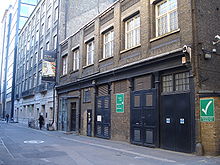
The current main building of the Petrie Museum of Egyptian Archaeology which is expected to move into the Panopticon building upon its completion
UCL is responsible for several museums and collections in a wide range of fields across the arts and sciences:
- Petrie Museum of Egyptian Archaeology: one of the leading collections of Egyptian and Sudanese archaeology in the world. Open to the public on a regular basis.
- Grant Museum of Zoology And Comparative Anatomy: a diverse Natural History collection covering the whole of the animal kingdom. Includes rare dodo and quagga skeletons. A teaching and research collection, it is named after Robert Edmund Grant, UCL's first professor of comparative anatomy and zoology from 1828, now mainly noted for having tutored the undergraduate Charles Robert Darwin at the University of Edinburgh in the 1826–1827 session. Open at limited fixed times and by appointment.
- Geology Collections: founded around 1855. Primarily a teaching resource and may be visited by appointment.
- Art Collections: these date from 1847 when a collection of sculpture models and drawings of the Neo-classical artist John Flaxman was presented to UCL. There are over 10,000 pieces dating from the 15th century onwards including drawings by Turner, etchings by Rembrandt, and works by many leading 20th century British artists. The works on paper are displayed in the Strang Print Room, which has limited regular opening times. The other works may be viewed by appointment.
- Institute of Archaeology Collections: Items include prehistoric ceramics and stone artefacts from many parts of the world, the Petrie collection of Palestinian artefacts, and Classical Greek and Roman ceramics. Visits by appointment only.
- Ethnography Collections: This collection exemplifying Material Culture, holds an enormous variety of objects, textiles and artefacts from all over the world. Visits by appointment only.
- Galton Collection: The scientific instruments, papers and personal memorabilia of Sir Francis Galton. Housed in the department of biology. Visits by appointment only.
- Science Collections: Diverse collections primarily accumulated in the course of UCL's own work, including the operating table on which the first anaesthetic was administered. Items may be a viewed by appointment.
Medicine and UCL hospital
Main article: UCL Medical School
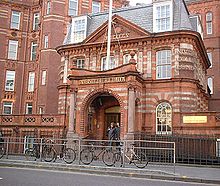
The entrance to the cruciform building, the home of the UCL Medical School
The UCL Medical School offers degrees in medicine which take six years to complete. UCL has offered courses in medicine since 1825 but the current medical school is a merger of two other schools, that took place in 1998. UCL’s 11 associated teaching hospitals – which include the Great Ormond Street Hospital for Children, the Royal Free Hospital and Moorfields Eye Hospital – provide Londoners with first-rate healthcare as well as contribute to major advances in medical research.
Main article: University College Hospital
Whittington Hospital and Royal Free Hospital
Clinical medicine is primarily taught at three hospitals in London; University College Hospital, The Royal Free Hospital and The Whittington Hospital. University College Hospital is one of central London's largest NHS hospitals and is part-financed by the university. UCL's hospital facilities are located around Bloomsbury but the main hospital facility, including accident and emergency, is located on Euston Road. In 2004 work began to rebuild the main hospital, most of the work is now finished with the final extension due for completion by 2008. UCL also operates its own medical research company, UCL Biomedica.
UCL is a member of the UCL Partners academic health science centre.
in 2007 UCL joined with the Medical Research Council, Cancer Research UK and the Wellcome Trust to establish the UK Centre for Medical Research and Innovation. This centre will be set on a site in London between the British Library and St Pancras Eurostar terminal, and will be one of the world’s largest medical research centres, housing 1,500 scientists and support staff working on a range of biomedical projects.
Student accommodation
Many UCL students are accommodated in the college's own halls of residence or other accommodation, such as those below:
- Arthur Tattersall House (115–131 Gower Street)
- Astor College (99 Charlotte St)
- Campbell House East and West (Taviton Street)
- Ifor Evans & Max Rayne Student Residences (109 Camden Road)
- Frances Gardner House and Langton Close (Gray's Inn Road)
- John Tovell House (89 & 93–7 Gower Street)
- John Dodgson House (Bidborough Street)
- Ramsay Hall and Ian Baker House Student Residences(Maple Street)
- Schafer House Student Residence (Drummond Street)
- James Lighthill House (Pentonville Road)
- Goldsmid House will reopen in brand new buildings for the 2008–2009 session, relocated from Oxford Street to Westminster. (The building is named after Sir F. H. Goldsmid, a treasurer of the University in the 19th century.)
Most students in college or university accommodation are first-year undergraduates. The majority of second and third-year students and postgraduates find their own accommodation in the private sector. This is partly due to the fact that accommodation in and around Central London is often cheaper than university accommodation when shared with friends or flat-mates.
There is also limited UCL accommodation available for married students and those with children at Bernard Johnson House, Hawkridge, Neil Sharp House and the University of London's Lilian Penson Hall.
Intercollegiate halls of residence
UCL students are also eligible to apply for places in the University of London intercollegiate halls of residence. The halls are:
- Canterbury Hall, Commonwealth Hall, College Hall, Connaught Hall, Hughes Parry Hall and International Hall near Russell Square in Bloomsbury
- Lillian Penson Hall (postgraduates only) in Paddington
- Nutford House in Marble Arch
Some students are also selected to live in International Students House, London.
University College London Union
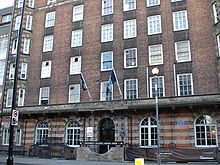
The University College London Union main building on Gordon Street, Bloomsbury
Main article: University College London Union
The union, founded in 1893, has a credible claim to be England's oldest students' union. Today the union exists to provide a wide range of services to UCL students. It is run by elected student officers, and supports a range of services, including numerous clubs and societies, sports facilities, and an advice service, as well as a number of bars, cafes and shops.
Some examples of Clubs provided by the University College London Union:
UCL Union Fencing Club
University College London Boat Club (both Men's and Women's clubs)
Pi Media (responsible for Pi Magazine and Pi Newspaper, UCL's official student publications)
UCL Cross Country and Athletics Club
University College London Dramatic Society
UCL Yoga and Meditation Society
UCL Karting Society
UCL Krishna Consciousness Society
UCL Football Club (consisting of 7 teams)
UCL Rugby Club (both Men's and Women's as well as Medical School clubs)
The Cheese Grater Magazine
King's College London rivalry
- Main Article Student Rags
UCL has a long-running, mostly friendly, rivalry with King's College London within the University of London. UCL is often referred to by students from the latter using nicknames such as the "Godless Scum of Gower Street", in reference to a comment made at the founding of KCL, which was based on Christian principles. UCL students and staff also refer to King's as "Strand Polytechnic" in a similar attitude. Historically the college rivalry was known as "Rags".
KCL's mascot, Reggie the Lion, was lost for many years in the 1990s. It was recovered after being found dumped in a field, restored at the cost of around £15,000 and placed on display in the students' union. It is in a glass case and filled with concrete to prevent theft, particularly by UCL students who once castrated it. (KCL, to be fair, had also stolen one UCL mascot, Phineas). It is often claimed that KCL students played football with the embalmed head of Jeremy Bentham. Although the head was indeed stolen, the football story is a myth which is unsupported by official UCL documentation about Bentham available next to his display case (his Auto Icon) in the college cloisters. The head is now kept in the college vaults.
A new lobby
Within the United Kingdom, UCL has been identified as part of a new group of universities which has started to act as a self-conscious lobby and pressure group: known commonly as the G5. According to the Times Higher Education Supplement (THES), the five institutions are the LSE, Imperial College London, University of Oxford, University of Cambridge, and University College London, and it describes them as the super-elite (as all five are already members of the elite Russell Group).
The G5 have begun to meet regularly and formally to plan their own path through the upheavals that are currently transforming British higher education, and to lobby for their own particular interests in maintaining the standards at the sharp end of tertiary education in the UK.
It has been reported in the THES that, "The group, which calls itself the G5, warns that without more money to support its high-quality teaching, its members will turn away British undergraduates and focus instead on overseas and postgraduate students, whose fees cover most of the full cost of their courses. The new group has been meeting in secret for a few months. Few vice-chancellors know of its existence as a fully fledged grouping. The G5's goal is to secure extra state cash above the £3,000 student top-up fees which from 2006 covered the full costs of home and European Union undergraduates on their courses. The G5 group will make a case for special treatment for its members."
Sir Richard Sykes, then rector of Imperial, said: "Imperial does not have any cheap courses. We will press the government to recognise this or lift the [£3,000] cap [on fees]. If they say our courses are too high quality and too expensive, we will not reduce our quality. We will have to look at expanding the number of postgraduates and overseas undergraduates we take."
These five institutions have been noted to share the following attributes which appear to have been the common binding factors: strong research outputs, high teaching ratings, many public figures, a major impact on global affairs and policy, and big international standing in academia. They also have some of the most influential and active student unions, with the overall University of London Student Union standing out for notable activism against successive governments, ranging from the 1968 storming of Downing Street, to more recent protests over the War on Iraq and student "top-up" fees.
In June 2009, Sir Roy Anderson, the former rector of Imperial College London, argued that, what he described as the top five universities in the UK – "Oxford, Cambridge, the London School of Economics, University College London and Imperial College London" – should be allowed to independently set their tuition fees. It was, he argued, the only way they could continue to maintain their presently high standards.
Filming at UCL
Main article: Filming at UCL
Due to its position within London and the historical nature of the UCL Main Building and quad, UCL has been used as a location for film and television productions.
Logo and arms
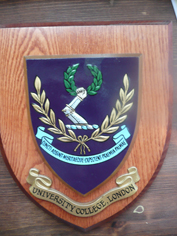
Coat of arms of University College London
Whereas most universities will primarily use a logo on documents but will still use their coat of arms on degree certificates etc., UCL seems to be content with exclusively using its logo. UCL does have a coat of arms which depicts a raised bent arm dressed in armour holding a green upturned open wreath.
The blazon of these arms is:
Purpure, on a wreath of the colours Argent and Blue Celeste, an arm in armour embowed Argent holding an upturned wreath of laurel Vert, beneath which two branches of laurel Or crossed at the nombril and bound with a bowed cord Or, beneath the nombril a motto of Blue Celeste upon which Cuncti adsint meritaeque expectant praemia palmae
The College's traditional sporting and academic colours of purple and light blue are derived from its arms.
Gallery
The UCL Main Building is the centre of the UCL campus
|
The College Cloisters inside the UCL Main Building
|
The UCL Quad, part of the main campus, in front of the UCL Main Building
|
The Jeremy Bentham common room inside the UCL Main Building
|
A night-time view of the UCL Main Building's portico
|
UCL Entrance on Gower Street and the Cruciform Building opposite
|
UCL Bedford Way – The building houses the psychology department and some of the geography department. It adjoins the Institute of Education
|
An example of student accommodation – UCL's Newest Hall of Residence — Frances Gardner House in Clerkenwell
|
The Flaxman Gallery, a collection of sculptures and paintings by artist John Flaxman is located inside the 'main library' in the Octagon building under UCL's central dome
|
Ramsay Hall of Residence, Maple Street, London
|
Jeremy Bentham overseeing the construction of UCL in the Flaxman gallery inside the 'main library'
|
UCL Institute of Archaeology, on Gordon Square
|
UCL School of Slavonic and East European Studies, on Taviton street
|
The new building and tower of University College Hospital, seen from Euston Road
|
Schafer House a hall of residence of University College London. It accommodates 369 students. It was opened in 1995.
|
参考文献
- ^ "University College London Financial Statements, July 2007" (PDF). University College London Financial Statements, 2007. http://www.ucl.ac.uk/finance/report_account_arch/report_accounts07.pdf. Retrieved 2009-02-21.
- ^ "Table 0a – All students by institution, mode of study, level of study, gender and domicile 2005/06". Higher Education Statistics Agency online statistics. http://www.hesa.ac.uk/holisdocs/pubinfo/student/institution0506.htm. Retrieved 2007-03-31.
- ^ "UCL | Fulbright University Partners | US-UK Fulbright Commission". Fulbright.co.uk. http://www.fulbright.co.uk/fulbright-awards/for-us-citizens/postgraduate-student-awards/university-partners/ucl. Retrieved 2010-04-26.
- ^ "Campus location maps, University College London". Ucl.ac.uk. http://www.ucl.ac.uk/about-ucl/location/maps. Retrieved 2010-04-26.
- ^ "History of UCL". Ucl.ac.uk. http://www.ucl.ac.uk/about-ucl/history. Retrieved 2010-04-26.
- ^ "UCL Bentham Project". Ucl.ac.uk. 2009-04-02. http://www.ucl.ac.uk/Bentham-Project/info/jb.htm. Retrieved 2010-04-26.
- ^ "Landmarks". Ucl.ac.uk. http://www.ucl.ac.uk/about-ucl/history/landmarks. Retrieved 2010-04-26.
- ^ 'UCL Unveils New Academic Dress' in UCL News. URL: < http://www.ucl.ac.uk/news/news-articles/0803/08032602 >, was live on 25 July 2008
- ^ "UCL School of Energy & Resources, Australia, to be established'". UCL News. 29 May 2008. http://www.ucl.ac.uk/news/news-articles/0805/08052901. Retrieved 2008-08-01.
- ^ http://www.ucl.ac.uk/images/Uni-Lon.pdf
- ^ "THES Table: Top 200". Times Higher Education. http://www.timeshighereducation.co.uk/Rankings2009-Top200.html. Retrieved 2009-06-01.
- ^ Profile: University College London – Times Online
- ^ Degree Awarding, University College London
- ^ UCL ACCOUNTS FOR 2008.http://www.ucl.ac.uk//finance/report_accounts/report_acc07-08.pdf KibibytePDF (1.45 MB)
- ^ "UCL Provost and President". Ucl.ac.uk. http://www.ucl.ac.uk/provost/. Retrieved 2010-04-26.
- ^ THE-QS World University Rankings TopUniversities.com
- ^ "University College London – The Student Room". Thestudentroom.co.uk. http://www.thestudentroom.co.uk/wiki/University_College_London. Retrieved 2010-04-26.
- ^ [1]
- ^ [2] in http://www.timesonline.co.uk/tol/life_and_style/education/good_university_guide/article526344.ece
- ^ Double first for Oxford – Times Online
- ^ [3] in http://www.guardian.co.uk/news/2005/aug/02/leadersandreply.mainsection
- ^ "The Complete University Guide". http://www.thecompleteuniversityguide.co.uk/single.htm?ipg=8727. Retrieved 2008-10-09.
- ^ "Research powerhouse: UCL top-cited in UK". Ucl.ac.uk. http://www.ucl.ac.uk/news/news-articles/0807/08071504. Retrieved 2010-04-26.
- ^ World ranking rise for UCL in UCL News, 20 August 2008. Retrieved 21 August 2008.
- ^ "THES – QS World University Rankings". http://www.timeshighereducation.co.uk/Rankings2009-Top200.html. Retrieved 2009-10-08.
- ^ "THES – QS World University Rankings". http://www.topuniversities.com/worlduniversityrankings/results/2008/overall_rankings/top_100_universities/. Retrieved 2008-10-09.
- ^ "THES – QS World University Rankings". http://www.topuniversities.com/worlduniversityrankings/results/2007/overall_rankings/top_100_universities/. Retrieved 2007-12-24.
- ^ "THES – QS World University Rankings 2006". THES. http://www.topuniversities.com/worlduniversityrankings/results/2006/overall_top_200_full_details/. Retrieved 2007-11-03.
- ^ "THES – QS World University Rankings 2005". THES. http://www.topuniversities.com/worlduniversityrankings/results/2005/top_200_universities/. Retrieved 2007-11-03.
- ^ Academic Ranking of World Universities by Shanghai Jiao Tong University 2009
- ^ Academic Ranking of World Universities by Shanghai Jiao Tong University 2008
- ^ "Academic Ranking of World Universities by Shanghai Jiao Tong University 2007". Ed.sjtu.edu.cn. http://ed.sjtu.edu.cn/rank/2007/ARWU2007FullListByRank.pdf. Retrieved 2010-04-26.
- ^ "Academic Ranking of World Universities by Shanghai Jiao Tong University 2006". Ed.sjtu.edu.cn. http://ed.sjtu.edu.cn/rank/2006/ARWU2006FULLLIST-BY%20RANK%20(PDF).pdf. Retrieved 2010-04-26.
- ^ "Academic Ranking of World Universities by Shanghai Jiao Tong University 2005". Ed.sjtu.edu.cn. http://ed.sjtu.edu.cn/rank/2005/ARWU2005FullList2.pdf. Retrieved 2010-04-26.
- ^ http://www.globaluniversitiesranking.org/images/banners/top-100(eng).pdf
- ^ "University Rankings League Table 2010 | Good University Guide – Times Online". Extras.timesonline.co.uk. http://extras.timesonline.co.uk/tol_gug/gooduniversityguide.php. Retrieved 2010-04-26.
- ^ "The Times Good University Guide 2008". The Times. http://extras.timesonline.co.uk/gug/gooduniversityguide.php. Retrieved 2007-11-03.
- ^ "The Times Good University Guide 2007 – Top Universities 2007 League Table". The Times. http://www.timesonline.co.uk/displayPopup/0,,102571,00.html. Retrieved 2007-11-03.
- ^ "The Times Top Universities". The Times. http://www.timesonline.co.uk/displayPopup/0,,32607,00.html. Retrieved 2007-11-03.
- ^ "University guide 2010: University league table | Education". guardian.co.uk. 2009-05-12. http://www.guardian.co.uk/education/table/2009/may/12/university-league-table. Retrieved 2010-04-26.
- ^ "University ranking by institution". The Guardian. http://browse.guardian.co.uk/education?SearchBySubject=&FirstRow=29&SortOrderDirection=&SortOrderColumn=GuardianTeachingScore&Subject=University+ranking&Institution=. Retrieved 2007-10-29.
- ^ "University ranking by institution". The Guardian. http://browse.guardian.co.uk/education/2006?SearchBySubject=&FirstRow=20&SortOrderDirection=&SortOrderColumn=GuardianTeachingScore&Subject=Institution-wide&Institution=. Retrieved 2007-10-29.
- ^ "University ranking by institution". The Guardian. http://education.guardian.co.uk/universityguide2005/table/0,,-5163901,00.html?start=40&index=3&index=3. Retrieved 2007-10-29.
- ^ "University ranking by institution 2004". The Guardian. http://education.guardian.co.uk/universityguide2004/table/0,,1222167,00.html. Retrieved 2009-01-19.
- ^ "University ranking by institution". The Guardian 2003 (University Guide 2004). http://education.guardian.co.uk/higher/unitable/0,,-4668575,00.html.
- ^ "The 2002 rankings – From Warwick". Warwick Uni 2002. http://www2.warwick.ac.uk/services/academicoffice/ourservices/planning/businessinformation/academicstatistics/2002/table_81.xls.
- ^ "The Sunday Times University League Table". The Sunday Times. http://extras.timesonline.co.uk/stug/universityguide.php. Retrieved 2009-09-13.
- ^ "The Sunday Times University League Table". The Sunday Times. http://extras.timesonline.co.uk/stug/universityguide.php. Retrieved 2008-10-08.
- ^ "University ranking based on performance over 10 years" (PDF). Times Online. 2007. http://extras.timesonline.co.uk/pdfs/univ07ten.pdf. Retrieved 2008-04-28.
- ^ "The Sunday Times University League Table" (PDF). The Sunday Times. http://extras.timesonline.co.uk/stug2006/stug2006.pdf. Retrieved 2007-11-03.
- ^ "The Complete University Guide 2010". Complete University Guide. http://www.thecompleteuniversityguide.co.uk/single.htm?ipg=8726.
- ^ "The Independent University League Table". The Independent. http://www.independent.co.uk/news/education/higher/the-main-league-table-2009-813839.html.
- ^ "University league table". The Daily Telegraph. http://www.telegraph.co.uk/news/main.jhtml;jsessionid=HXFCSGXMNVABTQFIQMFCFGGAVCBQYIV0?xml=/news/2007/07/30/ncambs430.xml. Retrieved 2007-10-29.
- ^ "University league table". The Daily Telegraph Table of Tables. http://www.telegraph.co.uk/education/graphics/2003/06/27/unibigpic.jpg.
- ^ "The FT 2003 University ranking". Financial Times 2003. http://www.grb.uk.com/448.0.html?cHash=5015838e9d&tx_ttnews%5Btt_news%5D=9&tx_ttnews%5Buid%5D=9.
- ^ "The FT 2002 University ranking – From Yourk". York Press Release 2003. http://www.york.ac.uk/admin/presspr/ft100league.htm.
- ^ "FT league table 2001". FT league tables 2001. http://specials.ft.com/universities2001/FT3HLLAN6LC.html.
- ^ "FT league table 2000". FT league tables 2000. http://specials.ft.com/ln/ftsurveys/industry/scbbbe.htm.
- ^ "FT league table 1999-2000". FT league tables 1999–2000. http://specials.ft.com/ln/ftsurveys/industry/pdf/top100table.pdf.
- ^ "UCL tops the THE league table in research grant wins". Ucl.ac.uk. 2009-09-03. http://www.ucl.ac.uk/silva/news/news-articles/0909/09090301. Retrieved 2010-04-26.
- ^ New centres for doctoral training listed by university
- ^ "Mathematics: Undergraduate Prospectus 2010: Prospective Students". UCL. 2010-03-15. http://www.ucl.ac.uk/prosp-students/prospectus/maps/mathematics/. Retrieved 2010-04-26.
- ^ "UK | Education | Cambridge entry level is now A*AA". BBC News. 2009-03-16. http://news.bbc.co.uk/1/hi/education/7946675.stm. Retrieved 2010-04-26.
- ^ "Facts and Figures". Ucl.ac.uk. http://www.ucl.ac.uk/about-ucl/facts. Retrieved 2010-04-26.
- ^ "20th Nobel Prize for UCL community". Ucl.ac.uk. 2007-10-08. http://www.ucl.ac.uk/news/news-articles/0710/07100801. Retrieved 2010-04-26.
- ^ "Sir William Ramsay: Noble Gas Pioneer—On the 100th Anniversary of His Nobel Prize". Chemeducator.org. http://chemeducator.org/sbibs/s0009006/spapers/960378gk.htm. Retrieved 2010-04-26.
- ^ "Faculty of Engineering Sciences". Ucl.ac.uk. http://www.ucl.ac.uk/news/right-column/ucl-views/engineering. Retrieved 2010-04-26.
- ^ http://www.ucl.ac.uk/alumni/pdfs/news.pdf
- ^ "Institute of Ophthalmology". Ucl.ac.uk. http://www.ucl.ac.uk/ioo/research/cordeira.htm. Retrieved 2010-04-26.
- ^ "UCL Library Services – Sites". Ucl.ac.uk. 2009-02-04. http://www.ucl.ac.uk/Library/sites.shtml. Retrieved 2010-04-26.
- ^ http://library.ucl.ac.uk/F?RN=632723792
- ^ "UCL Library Services – Main Library". Ucl.ac.uk. 2010-01-11. http://www.ucl.ac.uk/Library/main.shtml. Retrieved 2010-04-26.
- ^ "UCL Library Services – Cruciform Library". Ucl.ac.uk. http://www.ucl.ac.uk/Library/crucilib.shtml. Retrieved 2010-04-26.
- ^ "UCL Library Services – Environmental Studies Library". Ucl.ac.uk. 2010-01-11. http://www.ucl.ac.uk/Library/eslib.shtml. Retrieved 2010-04-26.
- ^ "UCL Library Services – SSEES Library". Ucl.ac.uk. http://www.ucl.ac.uk/Library/ssees.shtml. Retrieved 2010-04-26.
- ^ "UCL Library Services – Special Collections Library". Ucl.ac.uk. 2010-01-22. http://www.ucl.ac.uk/Library/special-coll/index.shtml. Retrieved 2010-04-26.
- ^ "UCL Library Services – Special Collections A-Z Directory". Ucl.ac.uk. 2008-09-08. http://www.ucl.ac.uk/Library/special-coll/azdirect.shtml. Retrieved 2010-04-26.
- ^ "UCL Library Services – Special Collections Library". Ucl.ac.uk. 2010-01-22. http://www.ucl.ac.uk/Library/special-coll/index.shtml#news. Retrieved 2010-04-26.
- ^ "UCL Library Services – Special Collections Library". Ucl.ac.uk. 2005-02-10. http://www.ucl.ac.uk/Library/special-coll/srbooks.shtml. Retrieved 2010-04-26.
- ^ 'UCL Eprints repository rankings' in UCL News (13 March 2008), http://www.ucl.ac.uk/news/news-articles/0803/08031304 . Retrieved 1 August 2008.
- ^ About UCL Eprints http://eprints.ucl.ac.uk/information.html . Retrieved 1 August 2008.
- ^ http://www.mssl.ucl.ac.uk/pages/
- ^ "UCL Museums & Collections | Home". Ucl.ac.uk. http://www.ucl.ac.uk/museums/. Retrieved 2010-04-26.
- ^ "Welcome to The Petrie Museum of Egyptian Archaeology". Petrie.ucl.ac.uk. http://www.petrie.ucl.ac.uk/. Retrieved 2010-04-26.
- ^ "UCL Museums & Collections". Grant.museum.ucl.ac.uk. http://www.grant.museum.ucl.ac.uk/. Retrieved 2010-04-26.
- ^ "UCL Museums & Collections". Ucl.ac.uk. http://www.ucl.ac.uk/museums/geology. Retrieved 2010-04-26.
- ^ "UCL Museums & Collections". Ucl.ac.uk. http://www.ucl.ac.uk/museums/uclart. Retrieved 2010-04-26.
- ^ "UCL Museums & Collections". Ucl.ac.uk. http://www.ucl.ac.uk/museums/archaeology. Retrieved 2010-04-26.
- ^ "UCL Museums & Collections". Ucl.ac.uk. http://www.ucl.ac.uk/museums/ethno. Retrieved 2010-04-26.
- ^ "UCL Museums & Collections | Home". Ucl.ac.uk. http://www.ucl.ac.uk/museums/galton. Retrieved 2010-04-26.
- ^ "UCL Museums & Collections". Ucl.ac.uk. http://www.ucl.ac.uk/museums/sciences. Retrieved 2010-04-26.
- ^ "UCL Medical School". Ucl.ac.uk. 2010-02-17. http://www.ucl.ac.uk/medicalschool. Retrieved 2010-04-26.
- ^ "UCL Medical School". Ucl.ac.uk. 2010-02-17. http://www.ucl.ac.uk/medicalschool/about-medicalschool. Retrieved 2010-04-26.
- ^ "UCLH Internet – University College London Hospital". Uclh.nhs.uk. http://www.uclh.nhs.uk/. Retrieved 2010-04-26.
- ^ "University College Hospital Recent building work due 2008". Uclh.nhs.uk. http://www.uclh.nhs.uk/New+developments/New+University+College+Hospital/. Retrieved 2010-04-26.
- ^ Suspended Domain
- ^ 'UCL in partnership for world-class medical research centre: St Pancras land sale' in UCL News, 5 December 2007: <http://www.ucl.ac.uk/news/news-articles/0712/07120501>. Retrieved 24 January 2009.
- ^ "Accommodation". Ucl.ac.uk. http://www.ucl.ac.uk/prospective-students/accommodation/. Retrieved 2010-04-26.
- ^ "University of London – Intercollegiate Halls". Lon.ac.uk. 2010-03-26. http://www.lon.ac.uk/halls.html. Retrieved 2010-04-26.
- ^ "UCL Union". UCL Union. 2010-04-13. http://www.uclunion.org/index.php. Retrieved 2010-04-26.
- ^ "Mayhem in the Metropolis: King's College versus University College in Student Rags". Kcl.ac.uk. http://www.kcl.ac.uk/depsta/iss/archives/rag/. Retrieved 2010-04-26.
- ^ "Mayhem in the Metropolis: King's College versus University College in Student Rags". Kcl.ac.uk. http://www.kcl.ac.uk/depsta/iss/archives/rag/rag05.htm. Retrieved 2010-04-26.
- ^ "Mayhem in the Metropolis: King's College versus University College in Student Rags". Kcl.ac.uk. http://www.kcl.ac.uk/depsta/iss/archives/rag/rag04.htm. Retrieved 2010-04-26.
- ^ [4]
- ^ "Times Higher Education – Education news, resources and university jobs for the academic world". Timeshighereducation.co.uk. 2004-02-06. http://www.timeshighereducation.co.uk/story.asp?storyCode=186508§ioncode=26. Retrieved 2010-04-26.
- ^ http://www.lse.ac.uk/collections/pressAndInformationOffice.bak/staffStudentsAndAlumni/dailyHeadlines/06-02-04.htm
- ^ Freeing universities to charge higher fees will be a bargain Terence Kealey, The Telegraph, June 2009
- ^ "Crest – The Student Room". Thestudentroom.co.uk. http://www.thestudentroom.co.uk/showthread.php?t=506124. Retrieved 2010-04-26.
- ^ "logobig on Flickr – Photo Sharing!". Flickr.com. 2007-07-30. http://www.flickr.com/photos/guyfwoodward/950670333/. Retrieved 2010-04-26.
External links
 |
London portal |
 |
University portal |
- UCL's YouTube channel http://www.youtube.com/ucltv
 |
Wikimedia Commons has media related to: University College London |
- UCL Online
- The History of UCL (YouTube.com) N.B. two short films designed to precede a UCL graduation ceremony – a few years old now, but nonetheless a good overview and insight.
- IT at UCL
- UCL Language Sciences
- UCL Eprints
- Pi Media, UCL's official student publications
"The Sunday Times University Guide". The Times. 2005. http://www.timesonline.co.uk/section/0,,24709,00.html. Retrieved 2006-09-09.



